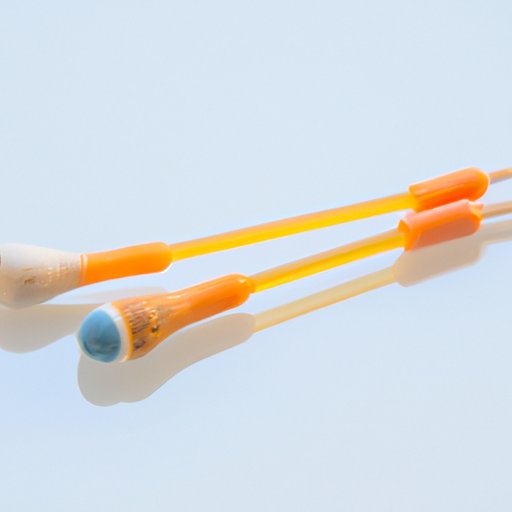
Introduction
If you’ve ever used Debrox ear drops to clean your ears, you may have wondered whether it’s safe to leave them in overnight. The answer, it turns out, is no. But what exactly is Debrox, and how does it work? And, more importantly, why can’t you leave it in your ear for too long? In this article, we’ll take an in-depth look at Debrox, explain its purpose and how to use it safely, and explore the potential risks associated with leaving it in your ear overnight.
An In-Depth Look at Debrox and Its Purpose
Debrox is an over-the-counter (OTC) medication that is used to soften and remove earwax. It contains carbamide peroxide, a compound that reacts with earwax to release oxygen and create a foaming action. This foaming action helps to break down and dissolve the earwax, making it easier to remove.
People use Debrox to clean their ears for a variety of reasons. Some people produce more earwax than others, which can lead to hearing problems or discomfort. Others may notice a buildup of wax after swimming or wearing earplugs. Debrox can help to reduce these symptoms and improve overall ear health.
Safety Precautions and Warnings When Using Debrox
While Debrox is generally considered safe when used as directed, there are some important precautions and warnings to keep in mind. For example, the package label warns against using Debrox on children under 12 years of age without first consulting a doctor. It also cautions against using the medication if you have an ear infection, ear drainage, or pain.
Why are warnings like these so important? Because Debrox, like any medication, can cause side effects or complications if not used properly. For example, if you have a perforated eardrum (a hole in your eardrum), using Debrox could cause the medication to enter your middle ear, which could lead to infection or other complications. In addition, Debrox can cause skin irritation or sensitivity in some people.
Tips for Effectively Using Debrox, Including How Long it Should Be in Your Ear
If you decide to use Debrox to clean your ears, there are some important steps you should take to ensure that you use it safely and effectively. First, be sure to read the package label carefully and follow the instructions for use. This will help you understand how much medication to use, how often to use it, and how long to leave it in your ear.
According to the Debrox package label, you should use 5-10 drops of medication in each affected ear, once or twice a day, for up to four days. After each use, you should rinse your ear with warm water to remove any remaining debris.
It’s important to note that you should not leave Debrox in your ear for longer than the recommended time period. Doing so can lead to a variety of complications, including skin irritation, inflammation, or even damage to the ear canal or eardrum.
Debrox vs. Other Ear-Cleaning Methods: What Makes Debrox Unique
There are many different ways to clean your ears, including cotton swabs, ear candles, and ear irrigation kits. However, Debrox is unique in that it uses a chemical reaction to soften and dissolve earwax, rather than simply removing it mechanically. This means that Debrox can be a more gentle and effective option for people with sensitive ears or those who produce a lot of wax.
That being said, no ear-cleaning method is perfect, and each has its own risks and benefits. For example, using cotton swabs can actually push wax deeper into your ear canal, while ear candles can cause wax to be deposited in the ear canal and may even cause burns or injury. Ear irrigation kits, which use a stream of water to flush out earwax, can be effective but may also damage the delicate structures inside the ear if used improperly.
The Potential Dangers of Leaving Debrox in Your Ear Overnight
While using Debrox as directed is generally safe, leaving it in your ear overnight is not recommended. Doing so can lead to a variety of complications, including skin irritation, inflammation, or even damage to the ear canal or eardrum. In addition, leaving Debrox in your ear overnight can increase your risk of developing an ear infection or other complications.
The Effects of Long-Term Debrox Use
While occasional use of Debrox is unlikely to cause any serious long-term effects, using the medication too frequently or for too long can lead to a variety of complications. For example, overuse of Debrox can cause irritation or damage to the delicate skin inside the ear canal or eardrum. It can also disrupt the natural balance of earwax, which can lead to increased production or a higher risk of infection.
Steps to Take if You Accidentally Leave Debrox in Your Ear Overnight
If you accidentally leave Debrox in your ear overnight, the first step is to try to remove it as soon as possible. The longer the medication remains in your ear, the greater the risk of complications. Here are some tips for removing Debrox safely if it’s stuck in your ear:
- Tilt your head to the side and gently pull your earlobe to straighten your ear canal.
- Use a bulb syringe to flush warm water into your ear, which can help to dislodge any remaining medication.
- If the medication still won’t come out, see a healthcare provider as soon as possible for further treatment.
Conclusion
Debrox can be a helpful tool for cleaning your ears and reducing symptoms of earwax buildup. However, it’s important to use it safely and effectively to avoid complications. Never leave Debrox in your ear overnight or use it more frequently than recommended, and be sure to follow all instructions on the package label. If you experience any pain, discomfort, or unusual symptoms after using Debrox, be sure to seek medical attention promptly.




